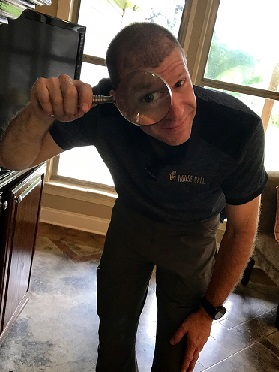I’m going to assume that if you’re reading this article, the odds are pretty good that you’re running your own business, quite likely as a professional home inspector. It’s also likely that you’ve held down at least one “real” job before becoming a small business owner, spending your valuable time working for someone else. You’ve probably felt the frustration of punching a clock, working a schedule dictated by someone else, and putting widgets into their respective holes.

Some people are perfectly content working for someone else, letting their bosses deal with the realities of running a business, while they just do their job. They’re happy simply showing up for work, doing what they’re told and collecting a paycheck at the end of the week. For many people, it’s a perfectly acceptable way to make a living: keep your head down, do your work and live for the weekend.
While there’s nothing wrong with that way of life, for some reason it just didn’t work out for us. We wanted something more from our career. Maybe the longing was always there, maybe it snuck up on us later in life, but either way we wanted to do something different than punching the clock.
So, we did it; we took the leap and started a business, our own small business. We quit our “regular” jobs and set out to try our hand at being an entrepreneur. Even though we had no idea what the hell we were doing in the beginning (and maybe some of us still feel that way), we did it anyway.
While it didn’t work out for many of our competitors, some of us figured out a way to make it work. It may have been difficult, it may have been painful, and it probably cost us a lot more than we thought it would. We still struggle, we’re still looking for our big break, and often we wonder what the hell we were thinking getting into this, but we’re still here. We’re small business owners in the 21st century.
Running our own business is certainly rewarding, as there’s a great deal of personal satisfaction that comes along with all the pain. But, if we’re not careful, being a small business owner can overwhelm us, taking such a toll on our lives that when it’s over, we’re wondering what went wrong instead of proudly looking back on all we’ve achieved.
There are some common problems that plague all small businesses. Things that often take control of our lives and lead us down the path to trouble and stress instead of triumph and success. Knowing which setbacks to look out for can often prove to be the difference between enjoying your business and dreading going to work every day.
These are seven of the most common pitfalls that affect small business owners. While reading them, step back and take a look at your business life. If you can, identify which of these are currently getting in the way of your happiness, and vow to make the changes necessary to overcome these hurdles and start enjoying your life.
1) Expecting immediate results
Undoubtedly, this hazard is a result of our instant gratification world, where we’re all trained to want results now. Whether it’s buying something on Amazon and getting it delivered tomorrow, ordering a pizza on a phone app and having it delivered to our door in 30 minutes or clicking a movie on our TV and watching it instantly, we’re all programmed to get what we want when we want it. Unfortunately, that’s not how it works when starting a new business.
Often, in the world of small business, results are difficult to come by. It may take months (or years) to realize the fruits of our labor. We may work long and hard on a new marketing program, spending lots of money and time getting things just so, only to see very small, incremental benefits from our investment.
We’re often left confused and disappointed, wondering exactly where we went wrong. We didn’t get the explosion of new business that we were expecting, so obviously something’s not right. If we could only fix that one thing, then we’d be swamped with clients beating down our doors.
In business, as in life, most things worth having take time. While it may seem like our new ad should be irresistible to our clients, we forget that the majority of our potential clients already have their chosen service provider. We’re not simply introducing potential clients to our amazing service, we’re trying to get them to leave the person they’ve already chosen and move over to us, someone who just showed up on the scene yesterday. It just doesn’t work that way.
It takes time to develop relationships, in life and in business. Small, incremental moves toward a professional relationship are what moves someone away from their current service provider to a new one like us. Most customers don’t switch just because we show them a really cool ad.
Our goal should be to get them to take notice of us, wondering what it is we’re offering and whether we’re worth investigating. We’re not going to get them to switch immediately; it’s simply not that easy. But, if we can plant the seed curiosity in their minds, maybe we can continue to water and nourish it until, one day, they feel comfortable enough to give us a shot.
Then, it’s up to us to wow them, proving that they we right to check us out. Cashing in on all that marketing we did, grabbing a new customer and making it harder for someone else to plant their own seed in our customer’s mind.

2) Skimping on the research
Even though we know it takes a while for us to find success, that doesn’t mean that we’re immune to wanting to take shortcuts. Each of us would like to find the quickest route to success that we can, skipping the hard work and jumping right into a big vat of money. Splash!
This desire to get things done quickly often leads us to make decisions without doing our homework. We see a new and exciting product, and we jump at it without checking it out. We think that our clients will love this new idea, and quickly move to implement it without doing our research.
This happens all the time in the home inspection industry. Some vendor will come up with a cool sounding idea and market it to unsuspecting inspectors. These inspectors, often desperate to get their businesses off the ground, buy it hook, line and sinker. Only, all too often, they’re the ones who end up getting sunk.
Just because you think that a product idea is wonderful, and that every one of your clients will be beating a path to your door, pushing wheelbarrows full of cash to buy your new, amazing offering, doesn’t mean that your dreams will come true. Just because you think it’s a great idea doesn’t mean that anyone else will.
Now, more than ever, it’s important to do your research before investing your hard-earned money into the next “get rich quick” scheme. Just because you think that it’s a no-brainer that every one of your home inspection clients will want to pay extra to have their indoor air quality tested doesn’t mean that it’s going to happen.
In research, relying on your own opinion doesn’t fly. It’s a sample size of one, and that’s simply not enough evidence on which to base a significant business investment. You need more data, more information, more opinions before you decide to do something different in your business.
Spend the time to do the research, polling clients (and potential clients) to see if they’re really interested in your new plan. See how many of them think it’s a good idea, and how many of them would be willing to pay their hard-earned money to buy it.
Do the research before taking that leap of faith. All too often, what looks great on paper and what seems like a no-brainer to us falls flat with our prospective clients. And we’re the ones left holding the (often all-too-expensive) bag.
3) Must be the money
While money may be considered the root of all evil, it’s undoubtedly a necessary evil. Without money, it’s certainly difficult to live. We need money to pay our bills, to put a roof over our family’s heads, to feed and clothe them, and to pay our bills. It’s one of the main reasons we go to work every day: to provide for the ones that we love.
Yes, money is certainly one of the reasons why we work. Without it, we wouldn’t be able to survive. But we have to make sure that money isn’t our sole motivation. We need to have something driving us besides the money. Money’s nice, that’s for sure, but it shouldn’t be our main focus.
We’ve got to have passion in our lives. We need things that we care about to help motivate us to get out of bed in the morning. Whether it’s our family, our friends or simply a desire to help people and make the world a better place, we need something else besides money to motivate us.
Most of us are good people, and we’re driven by an innate desire to make things better for those around us. If we do good things in our business, if we focus on providing value to our clients, helping them out in their time of need, we will eventually prosper. Money should be the result of your good deeds, not the sole reason for what you do.

On the other hand, we can’t ignore the fact that one of the main reasons we’re in business is to make a living. We can’t simply go around, always giving away everything we do for free. It’s incumbent upon us to make sure that we’re earning a living while we’re doing our job. If we don’t make enough money to survive, to pay our own way and take care of the ones that we love, then we’re doing a disservice to everyone we know.
Many small business owners have a difficult time asking for an adequate amount of money from their clients. We might feel uncomfortable when it comes time to collect payment for the work that we’ve done. We may simply neglect to get paid, or we accept way too little compensation for our labor. Even though we may justify this by thinking that we’re helping out our clients, if we do this too much, we soon won’t be around to help anyone, as we’ll no longer be able to stay in business if we’re not meeting our financial obligations.
Making money is vitally important to the survival of our business. Just make sure that it’s the byproduct of how well we serve our clients, and not our sole focus.
“My philosophy has always been do what you love and the money will follow.”
Amy Weber
This is the first part of a two-part series. Click here to read the second part of the 7 Pitfalls of Small Business.
I welcome all feedback (both positive and negative) on this post.
Please take a moment to leave a comment below. Thank you!
Want to be an Influencer in Your Field? Share This Post!
Thanks, Joe

